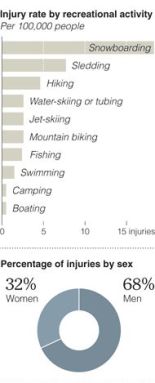 Believe it or not, but we all take risks. We take a risk every time we drive, go to the store, or eat dinner at a restaurant. When we drive, there is a risk of an accident. When we go to the store, there is a risk that we could slip and fall on spilled milk in isle 8. At a restaurant, there is a risk of eating contaminated food and getting sick.
Believe it or not, but we all take risks. We take a risk every time we drive, go to the store, or eat dinner at a restaurant. When we drive, there is a risk of an accident. When we go to the store, there is a risk that we could slip and fall on spilled milk in isle 8. At a restaurant, there is a risk of eating contaminated food and getting sick.
Some risks are bigger than others. Football, skiing, snowmobiling, ski diving, and racing are all risky activities. Men are responsible for 68% of all injuries, while women only 32%. Young people under the age of 24 account for a third of all injuries. Unfortunately, for me, these statistics ring true for me, but that’s another story.
Insurance companies make money by discriminating people based on age, sex, and past medical history to account for the likelihood of accidents, medical procedures, or injury. Financial companies charge people more money for loans if they are deemed more likely to default on a loan. The bigger the risk, bigger the potential reward or loss. Millions of dollars are invested in “venture capital” projects that could either fail or make a ton of money.
Risk is big business… I guess you can say a risky business.

 A fresh
A fresh  Author Russell Rathbun spoke with On the Bema about his new book,
Author Russell Rathbun spoke with On the Bema about his new book,  As part of Judson Press’
As part of Judson Press’  prayer and religious affiliation has arrived:
prayer and religious affiliation has arrived: With mega-churches basking in the spotlight of mainstream media, several studies have been done about the mega-church movement that might just surprise you. A
With mega-churches basking in the spotlight of mainstream media, several studies have been done about the mega-church movement that might just surprise you. A  The Baby Boomer generation is often thought as the generation that worked hard, help get us where we are, and was the backbone of the 20th century. Now that Baby Boomers are retiring, many have asked the question, “Who will take their place?” Generation X? No.
The Baby Boomer generation is often thought as the generation that worked hard, help get us where we are, and was the backbone of the 20th century. Now that Baby Boomers are retiring, many have asked the question, “Who will take their place?” Generation X? No. for us into Christianity.” – is the comment that I heard from a wedding I once officiated. Over the years, I have been conflicted by couples who come into my office asking me to officiate their wedding. Normally, I have no problem doing a wedding for a church member or Christians who do not have a church home. What has been a growing trend for a number of pastors, including myself, is what to do with non-Christian weddings?
for us into Christianity.” – is the comment that I heard from a wedding I once officiated. Over the years, I have been conflicted by couples who come into my office asking me to officiate their wedding. Normally, I have no problem doing a wedding for a church member or Christians who do not have a church home. What has been a growing trend for a number of pastors, including myself, is what to do with non-Christian weddings? sentence, but the The New York Times did just that when the newspaper wrote an
sentence, but the The New York Times did just that when the newspaper wrote an  There is a developing movement within literature to chronicle an outsider’s perspective on the strange land of Evangelical Christianity. It seems that the world sees all Evangelical Christians as fervent, ignorant, and misguided by a holy book. Being an Evangelical myself, I can see how the outside world can group all Evangelicals into this stereotype. The media tends to pick up on the extremes of any group, ideology, or religion and usually tries gives us the most radical angle. You would think that I would NOT recommend books about non-Christians views on Christianity, but there are two books that are worthy of your consideration about strangers in a strange land that yield some surprising insights.
There is a developing movement within literature to chronicle an outsider’s perspective on the strange land of Evangelical Christianity. It seems that the world sees all Evangelical Christians as fervent, ignorant, and misguided by a holy book. Being an Evangelical myself, I can see how the outside world can group all Evangelicals into this stereotype. The media tends to pick up on the extremes of any group, ideology, or religion and usually tries gives us the most radical angle. You would think that I would NOT recommend books about non-Christians views on Christianity, but there are two books that are worthy of your consideration about strangers in a strange land that yield some surprising insights.


You must be logged in to post a comment.